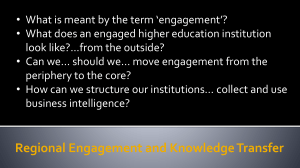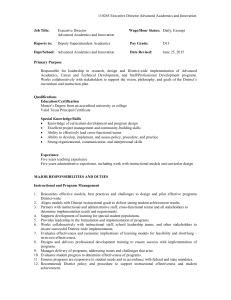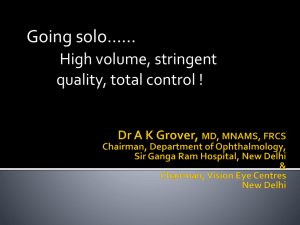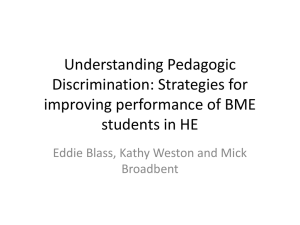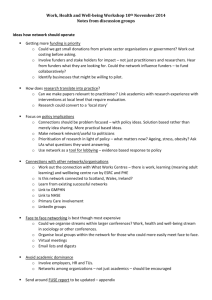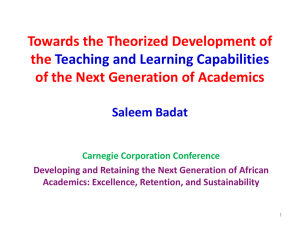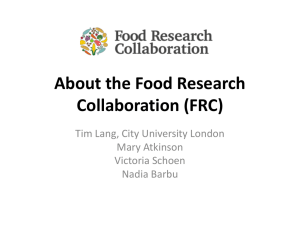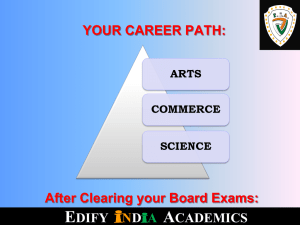Continuing Professional Development in Higher Education: Voices
advertisement
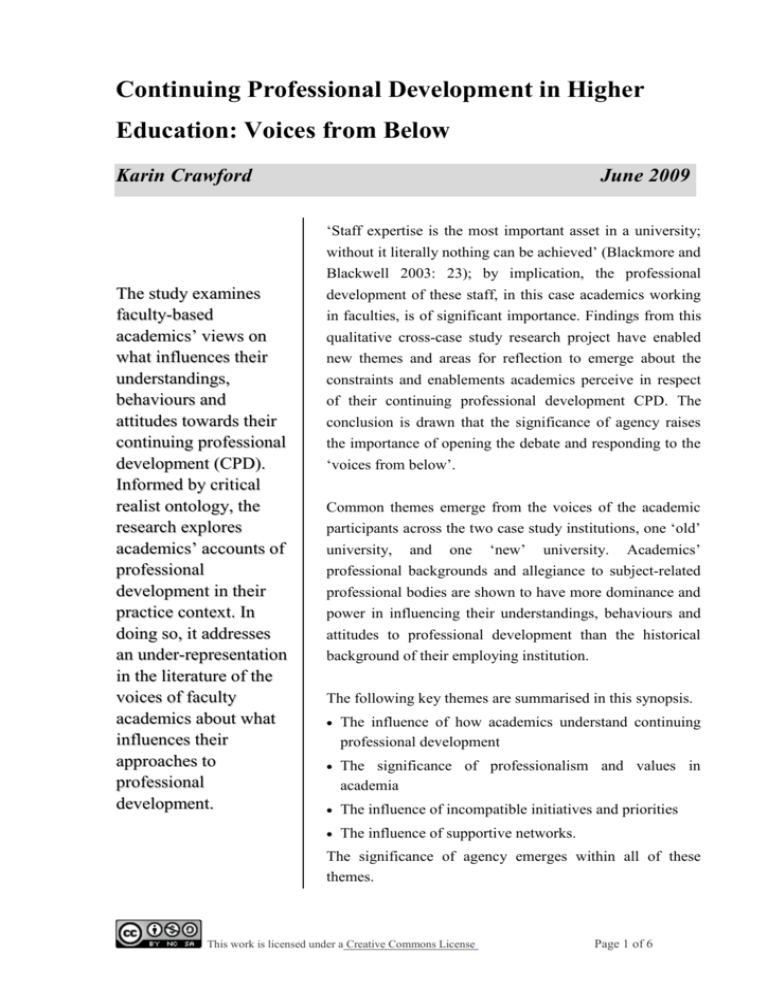
Continuing Professional Development in Higher Education: Voices from Below Karin Crawford The study examines faculty-based academics’ views on what influences their understandings, behaviours and attitudes towards their continuing professional development (CPD). Informed by critical realist ontology, the research explores academics’ accounts of professional development in their practice context. In doing so, it addresses an under-representation in the literature of the voices of faculty academics about what influences their approaches to professional development. June 2009 ‘Staff expertise is the most important asset in a university; without it literally nothing can be achieved’ (Blackmore and Blackwell 2003: 23); by implication, the professional development of these staff, in this case academics working in faculties, is of significant importance. Findings from this qualitative cross-case study research project have enabled new themes and areas for reflection to emerge about the constraints and enablements academics perceive in respect of their continuing professional development CPD. The conclusion is drawn that the significance of agency raises the importance of opening the debate and responding to the ‘voices from below’. Common themes emerge from the voices of the academic participants across the two case study institutions, one ‘old’ university, and one ‘new’ university. Academics’ professional backgrounds and allegiance to subject-related professional bodies are shown to have more dominance and power in influencing their understandings, behaviours and attitudes to professional development than the historical background of their employing institution. The following key themes are summarised in this synopsis. The influence of how academics understand continuing professional development The significance of professionalism and values in academia The influence of incompatible initiatives and priorities The influence of supportive networks. The significance of agency emerges within all of these themes. This work is licensed under a Creative Commons License Page 1 of 6 Background ‘Continuing Professional Development? I’m looking at a jigsaw puzzle with pieces missing’ (Sharon) ‘Demands on academics are so great these days, constant efficiency, increasing student numbers, decreasing staff numbers, more assessment, more auditing, greater performance management regimes, where do you find time to do any of that [continuing professional development]?’ (Phillip) The term ‘continuing professional development’ is widely used across a range of occupational fields. There is, however, a lack of clarity and agreement about how it is defined, and some acceptance that the concept is ‘neither innocent nor neutral’ (McWilliam 2002: 289). Within the context of higher education, professional development for academics occurs in a complex environment of changing national policy directives; increasing demands on both institutions and academics themselves (Deem et al. 2008). The academic role has been changing to include a wider range of tasks and responsibilities (Blackmore and Blackwell 2003). Academics are required to have subject, research, teaching, leadership and administrative expertise. Additionally, debates about the ‘neo-liberalist’ university (Clegg 2009) and performance-led cultures reflect wider concerns about the impact of regulatory forces on professional development. The theoretical frame of critical realism The ontological meta-theory of critical realism has guided this research. Postulating that reality exists independently of whether it is observed or experienced, Bhaskar (1978) describes three domains of reality; it is the domain of the real, or causal level that is of particular relevance to this study. At this level generative ‘mechanisms’ can result in change or ‘events’ and, whilst they may not be tangible, they can produce ‘tendencies’; the consequence being that we seek to understand and explain these tendencies (Houston 2001). At the core of this research has been the relationship between structure and agency. Critical realism asserts that both have causal powers that need to be understood, or analysed separately. This work is licensed under a Creative Commons License Page 2 of 6 ‘Continuing professional development to me is kind of a term that gets bandied about a lot within the University and it’s something that you feel obliged to do without ever knowing what it might be’ (Diana) The influence of how academics understand continuing professional development The data shows that the meanings academics attribute to CPD and the terminology in use significantly influences their attitudes, values and approaches towards their development. Whilst explicit clarity of definition and consistency of terminology may be considered desirable, common language does not necessarily equate to common understanding and, furthermore, common understanding cannot be taken to imply agreement (Sayer 1992). The significance of professionalism and values in academia The voices of academics raised through this research indicate concerns and confusions about professional status. These ‘Any profession that wants to maintain its status … its power base, has to demonstrate to society that they are engaged in a process of development, that their staff are up to date and have contemporary knowledge’ (Sven) ‘constellations of concerns’ have significance for defining action and determining practices (Archer 2007: 17) related to CPD. Professionalism in academia is positioned between the tensions of a ‘government-imposed form of “expert professionalism” … focused on skill and standards’ (McLean 2008: 124), and the concepts of academic autonomy and critical social engagement. The data shows a divide between those who work within the mandatory requirements of an external, professional body and those who do not. Academics’ allegiances to disciplinary professional bodies can be highly influential. Some academics feel mandatory requirements do not meet their needs, are constraining and negatively influence their approaches to professional development. Other voices, particularly those who work within an external discipline-related framework, were more tolerant of such approaches. This work is licensed under a Creative Commons License Page 3 of 6 The influence of incompatible initiatives and priorities ‘When they get their PGCert, they sit back and OK that’s been done and completed and let’s focus on my research, which is what I prefer to do the most’ (George) ‘I’m very lucky really because I work with three other full time people in one office … and it’s great because we’ve got our individual desks but we’ve got a big table as well so we certainly work together, we help and support each other, we, yes, you feel very you know, you feel very well supported.’ (Chandra) Misaligned policies and priorities can have negative influences on academics’ attitudes and behaviours in respect of their CPD. Perceived incompatibility and lack of correlation between institutional and individual priorities are particularly constraining. Academics perceive their employers as having, at best, different priorities and, at worst, competing priorities. Greater compatibility between priorities of the external environment, the individual and their employing university, along with an holistic view of academic practice could be facilitated through shared, collaborative approaches to academic development, based on dialogue, listening and responding to all the relevant voices. The influence of supportive networks Whilst academics respond favourably to having individual control over their CPD, they experience support, guidance and clarity at institutional and extra-institutional levels as enabling and influential. Empowering relationships, commonly formed through informal, ad hoc mentoring-type alliances, were influential not only to career planning, but in influencing approaches to practice and CPD. Within both case study institutions however the approach to such networks or mentoring was inconsistent. Academics also described being highly motivated to develop, maintain and grow external subject-related networks to support a range of academic endeavours, including CPD and career progression. They also saw ‘externality’ as being achieved through allegiance to their discipline-related professional body and they described how subject-related conferences provided inspiration and motivation. This work is licensed under a Creative Commons License Page 4 of 6 ‘There are opportunities there if people want to take them on…I would say that it was led by the academics, in my experience’ (Imran) ‘You see someone who is a senior professor … how did they get to there? How can I learn from their journey? So I’m always paying attention, as I … certainly want to get on … I’m thinking about how do I do that? (Marie) The significance of agency Individual, sometimes very personal, concerns can be seen to be a significant influence on how academics respond to professional development; examples include career progression, performative competence and personal circumstance. Within the latter, academics commonly included less tangible, often value-based, personal influences such as being interested, or stimulated, having a personal philosophy that values CPD, being able to see a ‘fit’ with personal circumstances and being able to make autonomous decisions about the direction of their professional development. An individual’s concerns act as a conduit to the influences on their approaches to professional development. The voices of academics participating in this research reveal all of the complexities of human deliberations and decision making, ‘using their own descriptions’ (Archer 2007: 12) that result in intentions and expectations. Conclusion ‘The problem of continuing professional development … of professionals in higher education is that it operates around a series of unresolved tensions’ (Clegg 2003: 37). These tensions result in a range of constraints and enablements, some of which arise from extrainstitutional factors, others from within the academic’s employing institution and others are very personal and intangible. This research suggests that it is possible for structural causal powers, in the form of extra- and intra-institutional approaches, to be more facilitative, aligned and responsive in order to generate enablements wherever possible. A more inclusive and holistic approach to academics’ CPD might be achieved by responding to the concerns of academics and engaging them in a construction of academic professionalism. The status of ‘professional’ ‘needs to be earned’ and includes ‘responsibility’ (McLean 2008: 125). Therefore whilst there is a right to participate and be listened to, there is a corresponding obligation to engage. The implications of what might be termed ‘academic citizenship’ (Macfarlane 2007) would include responsibilities related to one’s own and others’ professional development through overt engagement, articulation, supportive and sharing practice, and mentoring. This work is licensed under a Creative Commons License Page 5 of 6 About the research Situated in the context of higher education in England, this qualitative study focuses on academics’ narratives of CPD. To gain a comprehensive understanding of academics’ CPD practices this investigation set the data within the context of their discipline, their employing institution and national drivers (Crawford 2009). Data was collected during the academic year 2007-8, commencing with a pilot single case study. In recognition of the two different types of institutions that characterise the English system of higher education, the substantive qualitative data was collected in two case study English universities, one ‘old’ university and one ‘new’ university. The qualitative comparative-case study approach included semi-structured, narrative interviews with academics, more structured interviews with ‘key informants’ and examination of relevant institutional documents. References Archer, M. S. (2007) Making our Way through the World: Human Reflexivity and Social Mobility, Cambridge: Cambridge University Press Bhaskar, R. (1978) ‘On the possibility of social scientific knowledge and the limits of naturalism’ Journal for the Theory of Social Behaviour (8)1, 1-28 Blackmore, P. and Blackwell, R. (2003) ‘Academic roles and relationships’ in R. Blackwell and P. Blackmore (eds) Towards Strategic Staff Development in Higher Education, Berkshire: SRHE and Open University Press pp 16-28 Clegg, S. (2003) ‘Problematising Ourselves: Continuing Professional Development in Higher Education,’ International Journal for Academic Development 8(1/2), 37-50 Clegg, S. (2009) ‘Forms of knowing and academic development practice,’ Studies in Higher Education 34(4), 403-416 Crawford, K. (2009) ‘Continuing Professional Development in Higher Education – tensions and debates in a changing environment’ in L. Bell, H. Stevenson and M. Neary (eds) The Future of Higher Education: Policy, Pedagogy and the Student Experience, London: Continuum pp 69-83 Deem, R., Hillyard, S. and Reed, M. (2008) Knowledge, Higher Education, and the New Managerialism: The Changing Management of UK Universities, Oxford: Open University Press Houston, S. (2001) ‘Beyond Social Constructionism: Critical Realism and Social Work’ British Journal of Social Work 31, 845-861 Macfarlane, B. (2007) ‘Defining and Rewarding Academic Citizenship: The implications for university promotions policy’ Journal of Higher Education Policy and Management 29(3), 261-273 McLean, M. (2008) Pedagogy and the University, London: Continuum McWilliam, E. (2002) ‘Against Professional Development’ in Educational Philosophy and Theory 34(3), 289-299 Sayer, A. (1992) Method in Social Science: A Realist Approach, (2nd ed.), London: Routledge Acknowledgement This research was made possible by the hospitality, interest and honesty of participants in the case study institutions; their receptiveness to this research has been very much appreciated More information about the research and the researcher can be found at http://webpages.lincoln.ac.uk/kcrawford/ and www.karincrawford.info or email kcrawford@lincoln.ac.uk This work is licensed under a Creative Commons License Page 6 of 6
